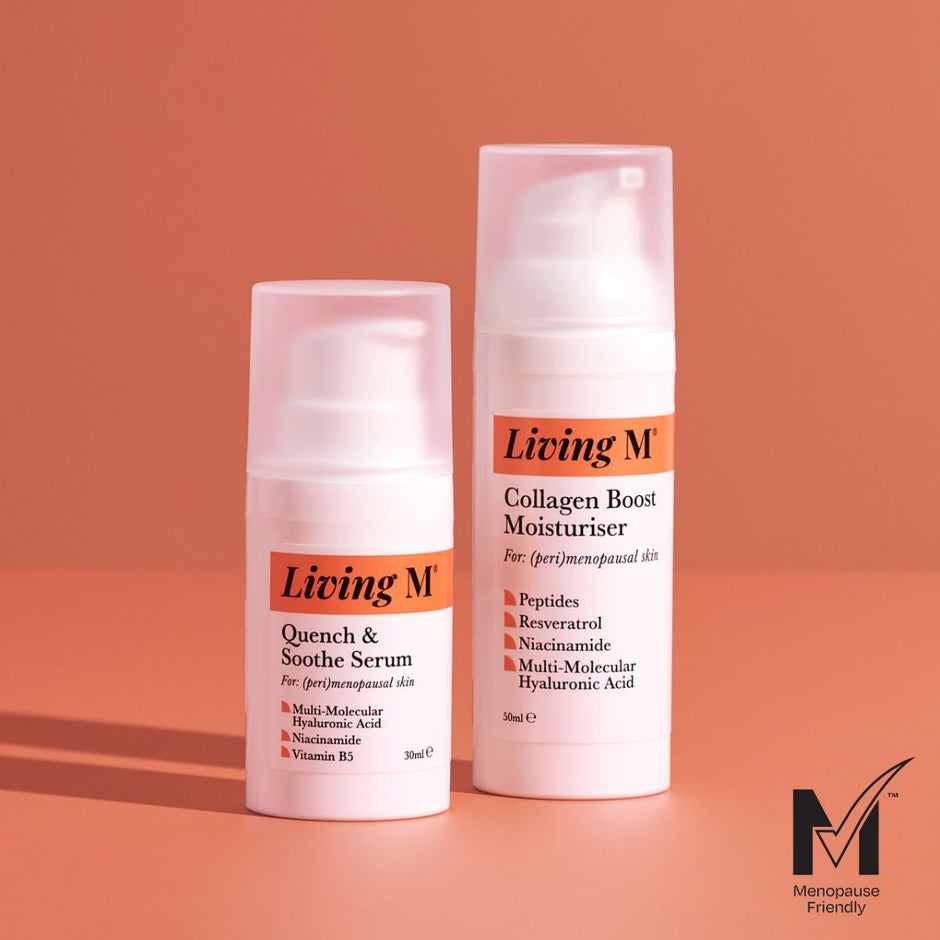The menopause isn’t all hot flashes and missed periods – there is a whole range of symptoms ranging from physical to psychological. There is no one size fits all with the menopause and every woman will experience it differently. Symptoms can also come and go - some can be debilitating and severely affect your life while some can be quite subtle. Whilst this list isn’t exhaustive there are actually 34 different recognised symptoms associated with perimenopause and menopause. More and more symptoms are being linked to menopause as research continues but we think 34 is enough for now!
What is perimenopause? Perimenopause is the first stage of menopause when hormone levels start to fluctuate and decline. Most women enter this phase in their mid-40’s but it can happen earlier or later. On average the perimenopause stage lasts for around 4 years, but it can last for up to 10 years. Its during this time that you will probably start to experience menopausal symptoms.
What is menopause? The menopause actually refers to just one day – when you haven’t had a period for 12 months you have officially reached menopause. The average age for menopause in the UK is 51. After this you are post-menopausal but can continue to experience symptoms for years after your final period.
Here are 34 symptoms of perimenopause and menopause every woman should know about;
Physical symptoms
Hot flashes One of the most common symptoms of menopause, up to 79% of women will experience hot flashes. You’ll definitely know when you’re having one - a sudden wave of intense heat felt in your upper body – your face, neck and chest. Hot flushes can also be accompanied by sweating and redness. They can come on suddenly or you may feel them coming on more gradually. Some women experience chills or cold sweats.
Irregular Periods Irregular periods are often the first sign of perimenopause. Periods may become shorter or longer than usual or they could start to become lighter or heavier. You might also experience symptoms of PMS like bloating, fatigue and mood swings but miss your period that month.
Night Sweats Another common symptom of menopause. During the night hormone levels can swing and spike more drastically causing more severe hot flashes that can leave bedding and night clothes drenched
Breast tenderness Oestrogen and progesterone levels fluctuate and spike unpredictably in perimenopause making your cycle irregular. These hormonal changes cause fluid build-up in the breasts which can lead to breast tenderness and pain – much like they do when you are pregnant or during your period
Decreased libido A woman’s sex drive is controlled by oestrogen and testosterone levels. As these hormones start to decline so can our libido. The opposite can also happen too when hormone levels spike. Other symptoms of menopause like depression and anxiety can also affect libido
Vaginal Dryness Another side effect of declining oestrogen levels is vaginal dryness and vaginal atrophy (thinning of the vaginal wall). This can cause discomfort and pain during sex.
Headaches Women who suffer from hormone-related headaches or migraines can find they get much worse during perimenopause. Linked to falling oestrogen levels they can also occur much more frequently as we approach menopause.
Burning Mouth One of the lesser known and more unusual symptoms of menopause is burning mouth syndrome. Linked to a low oestrogen level symptoms include burning, tingling and numbness. This can affect the roof of the mouth, gums and lips
Change in taste Changes in oestrogen levels can affect your taste buds, other symptoms can include dry mouth and a bitter or metallic taste.
Fatigue A very common symptom of menopause and one that is very easy to put down to the stresses of every day life. The reality is that the hormone imbalance caused by perimenopause can cause crashing fatigue. Hot flashes, sleep disturbances and low mood can all contribute to feelings of total exhaustion
Bloating Fluctuating hormones can cause water retention leading to uncomfortable bloating. This is a common symptom during the perimenopausal phase.
Joint Pain Oestrogen is responsible for strengthening our bones. As it declines we become susceptible to inflammation which can cause pain and tenderness in our joints
Muscle tension and aches Along with joint pain, muscular pain is another symptom of menopause – your body might feel tighter, stiffer and more tender. Practicing self care through yoga, stretching and improved diet can help with this
Sleep disturbances Sleep issues are a very common during menopause. Hot flashes, night sweats and insomnia affect a lot of menopausal women. You may experience difficulty fall asleep, waking frequently during the night or waking early and finding yourself unable to get back to sleep. This along with night sweats can leave you wondering if you’ll ever have a good night’s sleep again.
Weight Gain The dreaded middle-aged spread is real. Hormonal changes make it much more likely to gain weight around your abdomen rather than your hips and thighs. Maintaining your usual also weight becomes much more difficult as we get older.
Electric shock sensations Some women experience electric shock sensations during the menopause – it's thought this could be linked to the effect of fluctuating oestrogen levels on the cardiovascular and nervous system
Digestive issues Hormonal changes can cause changes a range of digestive issues – indigestion, bloating, wind, constipation and cramping are all associated with menopause
Changes in Body Odour Another unexpected change brought by the menopause is a change to our natural scent. Menopause can raise our natural body temperature causing us to sweat more plus lower oestrogen means we are more likely to dehydrate making our sweat stronger.
Dizziness Dizziness around menopause is common caused by hormonal changes and other menopausal symptoms such as fatigue.
Stress incontinence Menopause causes the bladder muscles to become weaker and this can cause stress incontinence – a frequent or sudden urge to urinate
Osteoporosis The decline in oestrogen that occurs around menopause can affect bone density resulting in bone loss. In severe cases this can lead to osteoporosis.
Heart palpitations Menopausal women can sometimes suffer from heart palpitations – when your heart races or feels like its missing a beat. They can sometimes happen during a hot flash
Allergies Allergies can worsen during perimenopause and menopause and they can also appear for the first time. Histamine levels are directly linked to oestrogen levels and fluctuations can make you much more sensitive to allergies
Changes to Skin and Hair
Dry Skin As oestrogen levels decline, collagen production slows down. Collagen is the structural protein that keeps skin naturally moisturised. When collagen levels start to fall, skin loses its ability to hold on to water and produce natural oils. Skin becomes drier and thinner.
Hair Loss A lot of women notice hair loss during menopause. When oestrogen and progesterone levels drop hair becomes thinner and weaker and falls out more easily
Brittle nails Dry and brittle nails are a common symptom of perimenopause and menopause, again linked to falling oestrogen levels
Itchy skin Menopausal women notice itching all over their body as skin becomes drier and more sensitive
Adult acne Just like in puberty the hormonal imbalance caused by perimenopause can cause acne and breakouts. A lot of women of experience this in their lower face, around their jawline and the bottom of their cheeks
Psychological Symptoms
Mood swings Perimenopause can be an emotional rollercoaster and many women experience mood swings. Similar to the changes you experience during your period but in menopause they can be much more extreme
Anxiety or panic attacks As well as mood swings many menopausal women suffer from anxiety as a result of fluctuating oestrogen and progesterone. Some women going through menopause start to experience panic attacks – a feeling of sudden and intense anxiety with physical symptoms – a racing heartbeat, feeling dizzy, sweating and nausea
Difficulty Concentrating Again caused by declining oestrogen many women struggle with concentration during menopause. This can cause problems for many women at work with some women leaving their jobs because they feel they can no longer cope
Memory problems Brain fog is another troubling symptom for many women where they find it hard to focus, struggle to remember words, forget things and struggle to put their thoughts into words.
Irritability It is very common to feel more irritable in perimenopause. Hormonal changes, lack of sleep and other menopausal symptoms can all contribute to this.
Feeling unhappy or depressed Many menopausal women experience feelings of low mood and depression. The hormonal shifts that occur make put women at a higher risk for depression during this time. Some women can also suffer feelings of low self-esteem, loss of confidence and loss of interest in things they previously enjoyed.
These are the 34 recognised symptoms we discovered when researching our own perimenopausal symptoms. The good news is there is a lot that can be done to manage these symptoms and make the change easier on ourselves. Eating a healthy balanced diet, taking regular exercise, limiting alcohol and caffeine can all go a long way to easing a lot of these symptoms. Practicing self-care and limiting stress can also help us cope with what is often a very rocky road. HRT is the medical treatment for menopausal symptoms and works by replenishing depleted hormone levels. There are also various natural remedies that women use to help relieve specific symptoms including black cohosh, St John's Wort and Ginseng – always make sure you tell your doctor if you are using them as they can interfere with traditional medicines. We aren’t doctors but this is information we have found helpful in researching and managing our own perimenopausal symptoms.




